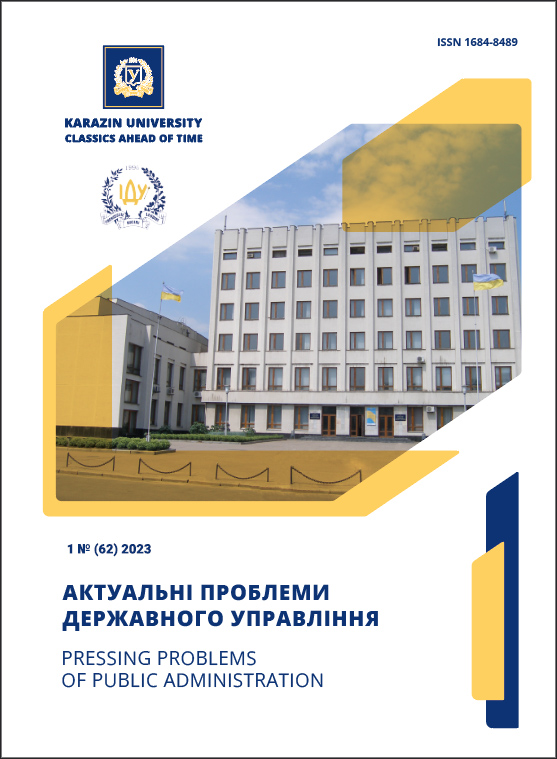Ключові чинники використання Crowd-технологій в діяльності органів місцевого самоврядування України
Анотація
Метою статті є концептуальне обґрунтування чинників, умов, обмежень щодо впровадження crowd-технологій в діяльність органів місцевого самоврядування.
Доведено, що реалізація crowd-технологій як прояв публічно-приватного управління передбачає наявність низки умов, необхідних для їх запровадження у практику місцевого самоврядування. Серед них визначено: нормативно-правове забезпечення crowd-технологічної діяльності; узагальнення досвіду (позитивного чи негативного) crowd-технологій; коректне визначення об’єктів crowd-технологій; інституціоналізація громадського актора, зацікавленого у crowd-технологіях; формування у населення громадянських компетентностей як властивостей індивіда, соціалізованого під впливом громадянсьФкого суспільства; забезпечення інформаційної доступності практик, пов’язаних із прийняттям рішень органами місцевого самоврядування, а також щодо адміністративних послуг, що надаються ними та комунальними установами й підприємствами; прояв лояльності органів місцевої влади до організації роботи за моделлю crowd-технологій, готовність їх керівників та службовців до співпраці з громадськістю; формування інтегрованих програмних продуктів для органів місцевого самоврядування, що ґрунтуються на засадах вільного програмного забезпечення.
Завантаження
Посилання
Hanushchyn, S.N. (2015). Theoretical and methodological aspects of crowdsourcing and crowdfunding implementation in the practice of public administration. Efficacy public administration, vol. 43, 81–90 [in Ukrainian].
Hvozdetskyi, A.M. (2014). Crowdsourcing in civil society: the modern mechanisms of direct democracy. Public law, 2, 301–307 [in Ukrainian].
Golka, V. (2015). Political crowdfunding: the nature, types, benefits of using. Scientific Journal of the National Pedagogical Dragomanov University. Political Sciences and Teaching Methodology of Socio-Political Disciplines, vol. 17, 82–87 [in Ukrainian].
Hrabchak, O.V. (2016). Crowdfunding as an innovative technology in social work. Collection of scientific works of Kamianets-Podilskyi National University named after Ivan Ohienko. Series: Social and pedagogical, vol. 26, 36–45 [in Ukrainian].
Dymova, O.V. (2018). Social justice as a qualitative component of political transformations in Ukraine. Politicus, vol. 3, 27–32 [in Ukrainian].
Dynnyk, I.P. (2020). Crawdsorsing technologies in civil society: modern mechanisms of partisipative democracy. Investytsiyi: praktyka ta dosvid, no. 21–22, 119–123. DOI: 10.32702/2306-6814.2020.21-22.119 [in Ukrainian].
Dunayev, I., Kud, A. (2020). Building the future for Ukraine: from intuitive prophecy to scientific synthesis. Bulletin of Postgraduate education. Social and Behavioral Sciences Series,
is. 12(41), 142–159. DOI: 10.32405/2522-9931/2522-9958-2020-12(41)-142-159 [in Ukrainian].
Karyy, O.I., Panas, Ya.V. (2016). Crowdsourcing as management tool: examples of solving local problems . Bulletin of the Lviv Polytechnic National University. Series: Problems of economics and management, no. 847, 213–219 [in Ukrainian].
Kovbasiuk, Y.V. (2016). Crowdsourcing as an instrument of authority. Actual problems of economics, no. 4, 349–357 [in Ukrainian].
Kosenko, O.P., Starytska, N.Yu. (2013). Crowdsourcing is a new method of modern marketing technologies. Bulletin of the National Technical University «KhPI». Series: Technical progress and production efficiency, no. 67(2), 93–98 [in Ukrainian].
Kravtsov, O. (2014). Using of crowdsourcing in modern public administration. State administration and local self-government, is. 4,15–23 [in Ukrainian].
Marchenko, O.S. (2013). Crowdsourcing technologies of knowledge management of an innovative firm. Bulletin of the National University «Law Academy of Ukraine named after Yaroslav the Wise». Series: Economic theory and law, no. 2, 276–278 [in Ukrainian].
Nyshenko, O. (2014). Crowdsoursing as the modern management instrument. Economic sciences. Series: Accounting and finance, is. 11(2), 231–237 [in Ukrainian].
Palagnyuk, Yu.V. (2021). Social trust in public authorities as a factor in the development of civil society. Public administration and regional development, no. 13, 699–725 [in Ukrainian].
Pakhomova, T., Rokotianskaya, A. (2019). Social trust in public authorities as a category of social governance. Socio-Economic Problems and the State (electronic journal), vol. 21, no. 2, 146–154 [in Ukrainian].
Perzhun, V. (2013). Social solidarity: essence, consolidation opportunities for Ukrainian society. Religion and society, no. 3–4, 201–207 [in Ukrainian].
Poltorak, K.A. (2015). Management of marketing communications in the era of crowd-technology. Marketing and Management of Innovations, no. 3, 66–75 [in Ukrainian].
Radchenko, O.V., Radchenko, O.O. (2018). Ontological Essence and Anthropologic Nature of the Societal Phenomenon of State Power. Bulletin of the National Academy of the State Border Service of Ukraine. Series: Public administration, vol. 2. URL: http://nbuv.gov.ua/UJRN/Vnadpsdu_2018_2_9 (data zvernennya 20.06.2023) [in Ukrainian].
Rohzyk, Y.V. (2015). The new vawe in development marketing research crowdsourcing technology. Scientific Bulletin of Kherson State University. Series: Economic Sciences, vol. 14(3), 141–144 [in Ukrainian].
Rud, O.V., Snytyuk, O.I., Berezhna, L.V. (2017). Crowdfunding: essence, types and prospects of implementation in Ukraine. Economy. Finances. Right, no. 6(2), 28–33 [in Ukrainian].
Sytnik, N.І. (2018). Crowdfunding: new opportunities and trends Scientific. Bulletin of Kherson State University. Series: Economic Sciences, vol. 31, 187–192 [in Ukrainian].
Filippova, V.D. (2021). Crowdfunding as a way of involving citizens in solving local development issues. Bulletin of the Kherson National Technical University, no. 2, 170–177
[in Ukrainian].
Bederson B. B., Quinn A.J. Web workers Unite! Addressing Challenges of Online Laborers. In: Proceedings of the 2011 annual conference extended abstracts on Human Factors in Computing Systems, CHI ’11. Vancouver, 2021. URL: https://dl.acm.org/doi/10.1145/1979742.1979606 (data zvernennya: 20.06.2023)
Howe Jeff. Crowdsourcing: Why the Power of the Crowd Is Driving the Future of Business. Crown Publishing Group: NY, 2008.
Kazai G. In Search of Quality in crowdsourcing for Search Engine Evaluation.
In Proceedings of the 33rd European conference on Advances in Information retrieval. Berlin,
P. 165- 167. URL: https://www.researchgate.net/publication/284980661_In_search_of_quality_in_crowdsourcing_for_search_engine_evaluation (data zvernennya: 20.06.2023)
Kleemann F., G. Voß, K. Rieder. Un(der)paid Innovators: The Commercial Utilization of Consumer Work through Crowdsourcing. Science, Technology & Innovation Studies. Vol. 4, No. 1,
July 2018. URL: https://www.researchgate.net/publication/42632427_UnderPaid_Innovators_The_Commercial_Utilization_of_Consumer_Work_through_Crowdsourcing (data zvernennya: 20.06.2023).

